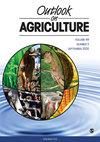应用循环经济原则加强撒哈拉以南非洲的畜牧业生产
IF 2.6
3区 经济学
Q1 AGRICULTURE, MULTIDISCIPLINARY
引用次数: 0
摘要
在可持续农业发展的背景下,人们非常重视应用农业生态学或再生原则来改善农村生计,并使该部门与关键的全球健康边界保持一致。这一运动是对工业化农业(主要是在高收入国家)的生产和消费所产生的私人和社会成本的反应,其中一些默认假设在其他地方的适用性很明显。循环性或循环经济的概念经常与农业生态修辞混为一谈,往往忽视了低收入环境中传统混合作物-畜牧业中循环资源利用效率的长期传统。本文探讨了循环性的概念和起源,并回顾了国际农业研究体系中应用于小农户农业的历史循环经济研究的一些例子。这些研究包括(i)侧重于作物残留物保留的影响的研究,(ii)关于残留物掺入和/或覆盖及其对作物产量和土壤肥力的影响的工作,(iii)关于粪肥使用对作物产量及土壤肥力的影响的研究,以及(iv)关于将作物残留物喂给牲畜的工作。我们认为一些有前景的创新或实践遵循循环经济原则。候选创新侧重于改进牲畜饲养做法,包括培育两用作物以提高牲畜营养,将谷物秸秆残渣转化为高质量饲料,将木薯废料用作牲畜饲料,以及将昆虫用作牲畜饲料。最后,我们考虑了如何在撒哈拉以南非洲粮食系统的未来演变中保持循环生物经济原则。本文章由计算机程序翻译,如有差异,请以英文原文为准。
Applying circular economy principles to intensification of livestock production in Sub-Saharan Africa
In the context of sustainable agricultural development, much has been made of the need to apply agroecology or regenerative principles to improve rural livelihoods and to align the sector with critical planetary health boundaries. This movement is a reaction to the perceived private and social costs arising from both production and consumption associated with industrialised agriculture, mostly in upper-income countries, with several default assumptions being apparent about applicability elsewhere. The notion of circularity, or the circular economy, is frequently conflated with agro ecological rhetoric, often overlooking a longer tradition of circular resource use efficiency in traditional mixed crop–livestock farming in low-income settings. This paper examines the concept and origins of circularity and reviews some examples of historic circular economy research within the international agricultural research system as applied to smallholder agriculture. These include (i) studies focusing on the impact of crop residue retention, (ii) work on residue incorporation and/or mulching and their effects on crop yields and soil fertility, (iii) research on the effects of manure use on crop yields and soil fertility and (iv) work on the feeding of crop residues to livestock. We consider some promising innovations or practices adhering to circular economy principles. Candidate innovations focus on the improvement of livestock feeding practices including the breeding of dual-purpose crops to enhance livestock nutrition, conversion of cereal straw residues to high-quality feed, use of cassava waste as livestock feed and use of insects as livestock feed. We conclude by considering how circular bio-economy principles might be maintained in the future evolution of food systems in Sub-Saharan Africa.
求助全文
通过发布文献求助,成功后即可免费获取论文全文。
去求助
来源期刊

Outlook on Agriculture
农林科学-农业综合
CiteScore
5.60
自引率
13.30%
发文量
38
审稿时长
>36 weeks
期刊介绍:
Outlook on Agriculture is a peer reviewed journal, published quarterly, which welcomes original research papers, research notes, invited reviews and commentary for an international and interdisciplinary readership. Special attention is paid to agricultural policy, international trade in the agricultural sector, strategic developments in food production, the links between agricultural systems and food security, the role of agriculture in social and economic development, agriculture in developing countries and environmental issues, including natural resources for agriculture and climate impacts.
 求助内容:
求助内容: 应助结果提醒方式:
应助结果提醒方式:


